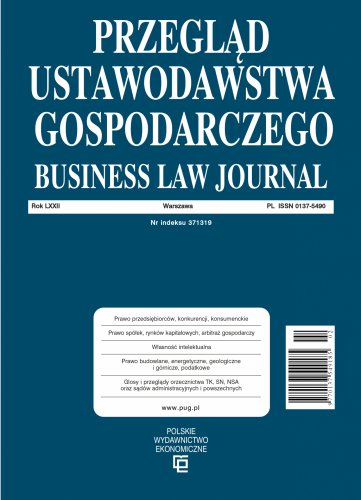Is there a need to separate under commercial and company law the law of family enterprises and family companies? General remarks from the perspective of German and Austrian law
This article opens a series of articles on the need to separate under Polish commercial and company law the law of family enterprises and family companies, as it is postulated in the German and Austrian corporate law doctrine. This article draws attention to the economic importance of enterprises and family companies in Poland, Germany and Austria, discusses the state of recognition of this issue in German, Austrian and Polish doctrine, and presents two basic definitional approaches to the issue of enterprises and family companies: the notion of an enterprise and a family company in a broad and in the strict sense. The confrontation of these two definitions of an enterprise and a family company leads to the conclusion that for understanding, analyzing and exploring the issues of family companies, the concept of a family company in the strict sense is essential and authoritative, which refers to the essence of family companies and the subjective element constituting them, which is the will of the founder/founders of a family business to run and continue the company for the next generations as a family business in a way that ensures its independence and multi-generational durability.
References
Bibliografia/References
Literatura/Literature
Bieluk, J. (2019). Ustawa o zarządzie sukcesyjnym przedsiębiorstwem osoby fizycznej. Komentarz. C.H.Beck.
Bieniek, T., & Machaj, R. (2022). Komentarz do art. 125 k.s.h. W: Z. Jara (red.), Kodeks spółek handlowych. Komentarz. Wyd. 26. C.H.Beck.
Bochmann, Ch., Scheller, J., & Prütting, J. (2021), Münchener Handbuch des Gesellschaftsrechts. Band 9. Recht der Familienunternehmen. 6. Auflage. C.H.Beck.
Fels, M., & Wolter, H.-J. (2022). Die volkswirtschaftliche Bedeutung von Familien- und Frauenunternehmen. Institut für Mittelstandsforschung Bonn. Daten und Fakten, (28). https://www.ifm-bonn.org/publikationen/daten-und-fakten/detailansicht/die-volkswirtschaftliche-bedeutung-von-familien-und-frauenunternehmen
Fleischer, H. (2017). The Law of Close Corporations. W: M. Schauer, & B. Verschraegen (Red.), General Reports of the XIXth Congress of the International Academy of Comparative Law. Rapports Généraux du XIXeme Congres de l'Académie Internationale de Droit Comparé. Springer Science+Business Media B.V. https://doi.org/10.1007/978-94-024-1066-2
Górniak, K. (2022). Zakres spraw regulowanych ustawą. W: K. Osajda (Red.), Ustawa o zarządzie sukcesyjnym przedsiębiorstwem osoby fizycznej. Prawo spadkowe przedsiębiorców. Komentarz. Wyd. 2. C.H.Beck.
Herbet, A. (2022). Komentarz do art. 431 k.c. W: P. Machnikowski (Red.), Zobowiązania. Przepisy ogólne i powiązane przepisy Księgi I KC. Tom I. Komentarz. C.H.Beck.
Holler, L. (2019a). Das Recht der Familienunternehmen und ihre Besonderheiten in der Rechtsanwendung und –gestaltung (Teil I). Das Gesellschaftsrechtrecht der Familienunternehmen – Auf dem Weg zu einem Sonderrecht? Deutsches Steuerrecht, (16–17).
Holler, L. (2019b). Das Recht der Familienunternehmen und ihre Besonderheiten in der Rechtsanwendung und –gestaltung (Teil II). Vom Familienverband der Gesellschafter zum besonderen Gesellschaftszweck der Familiengesellschaft als Geschäftsgrundlage und Wesensmerkmal des Familienunternehmens. Deutsches Steuerrecht, (18).
Jędrejek, G. (2006). Egzekucja przez zarząd przymusowy przedsiębiorstw rodzinnych. C.H.Beck.
Kalls, S., & Probst, S. (2013). Familienunternehmen. Gesellschafts- und zivilrechtliche Fragen. Manzsche Verlags- und Universitätsbuchhandlung.
Kopaczyńska-Pieczniak, K. (2023). Spółka komandytowo-akcyjna. W: M. Romanowski (Red.), Prawo spółek osobowych. System Prawa Prywatnego. Tom 16B. C.H.Beck.
Opalski, A (2018). Komentarz do art. 207 k.s.h. W: A. Opalski (Red.), Kodeks spółek handlowych. Tom IIA. Spółka z ograniczoną odpowiedzialnością. Komentarz. Art. 151–226. C.H.Beck.
Oplustil, K. (2010). Instrumenty nadzoru korporacyjnego (corporate governance) w spółce akcyjnej. C.H.Beck.
Pabis, R. (2022). Komentarz do art. 213 k.s.h. W: J. Bieniak, M. Bieniak, G. Nita-Jagielski, K. Oplustil, R. Pabis, A. Rachwał, M. Spyra, G. Suliński, M. Tofel, M. Wawer, & R. Zawłocki, Kodeks spółek handlowych. Komentarz. Wyd. 8. C.H.Beck.
Rachwał, A. (2019). Spółka z ograniczoną odpowiedzialnością. W: A. Szumański (Red.), Prawo spółek handlowych. Tom 2A. System Prawa Handlowego. Wyd. 3. C.H.Beck.
Sobiech, A. (2016). Opodatkowanie spółek osobowych. C.H.Beck.
Szumański, A. (2016a). Spółka komandytowa. W: A. Szajkowski (Red.), Prawo spółek osobowych. System Prawa Prywatnego. Tom 16. Wyd. 2. C.H.Beck.
Szumański, A. (2016b). Spółka komandytowo-akcyjna. W: A. Szajkowski (Red.) Prawo spółek osobowych. System Prawa Prywatnego. Tom 16. Wyd. 2. C.H.Beck.
Tarska, M. (2018). Sytuacja prawna małżonków jako współwspólników spółki z o.o. W: A. Dańko-Roesler, M. Leśniak, M. Skory, & B. Sołtys (red.), Ius est ars boni et aequi. Księga pamiątkowa dedykowana Profesorowi Józefowi Frąckowiakowi. Stowarzyszenie Notariuszy Rzeczypospolitej Polskiej.
Tarska, M. (2022). Zasada swobody umów w prawie spółek. Studia Prawa Prywatnego, (3).
Uffmann, K., & Becker, A. (2022). "Recht der Familienunternehmen" in die juristische Ausbildung! Recht der Familienunternehmen, (6).
Wielgus, K. (2022a). Komentarz do art. 872 k.c. W: K. Osajda (Red.), Kodeks cywilny. Prawo spadkowe przedsiębiorców. Komentarz. C.H.Beck.
Wielgus, K. (2022b). Komentarz do art. 60 k.s.h. W: K. Osajda (Red.), Kodeks spółek handlowych. Prawo spadkowe przedsiębiorców. Komentarz. C.H.Beck.
Wiórek, P. M. (2018). O braku potrzeby wprowadzenia prostej spółki akcyjnej (PSA) z perspektywy prawnoporównawczej. Przegląd Prawa Handlowego, (5).
Wiórek, P. M. (2021). „Ciemna strona” fundacji rodzinnej? Uwagi z perspektywy prawa niemieckiego. Przegląd Ustawodawstwa Gospodarczego, (11). https://doi.org/10.33226/0137-5490.2021.11.2
Zdanikowski, P. (2016). Ograniczenie lub wyłączenie wystąpienia spadkobiercy wspólnika a zapis windykacyjny udziałów w spółce z ograniczoną odpowiedzialnością. Przegląd Prawa Handlowego, (3).
Źródła internetowe/Internet sources
eGospodarka.pl. (2020). Firmy rodzinne przebadane przez GUS. 2020.02.26. https://www.egospodarka.pl/162169,Firmy-rodzinne-przebadaneprzez-GUS,1,39,1.html
European Commission. (2009). Final Report of The Expert Group. Overview of Family-Business-Relevant Issues: Research, Networks, Policy Measures and Existing Studies. European Commission. Enterprise and Industry Directorate-General, Promotion of SMEs' competitiveness. https://ec.europa.eu/docsroom/documents/10388/attachments/1/translations
GUS. (2018). Uwarunkowania rozwoju przedsiębiorczości w sektorze MŚP. Główny Urząd Statystyczny. https://stat.gov.pl/statystykieksperymentalne/badania-i-rozwoj-innowacyjnosc-spoleczenstwo-informacyjne/uwarunkowania-rozwoju-przedsiebiorczosci-w-sektorzemsp,1,1.html
KMU Forschung Austria. (2020). Familienunternehmen in Österreich 2019. Endbericht. KMU Forschung Austria. Austrian Institute for SME Research. https://news.wko.at/news/oesterreich/kmu-forschung-bericht-familienunternehmen-2019.pdf (dostęp: 23.02.2023)
Akty prawne/Legal acts
Ustawa z 23.04.1964 r. Kodeks cywilny (t.j. Dz.U. z 2020 r., poz. 1740 ze zm.).
Ustawa z 15.09.2000 r. Kodeks spółek handlowych (t.j. Dz.U. z 2022 r., poz. 1467 ze zm.).
Ustawa z 26.01.2023 r. o fundacji rodzinnej (Dz.U. z 2023 r., poz. 326).

